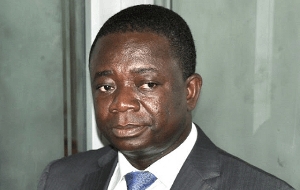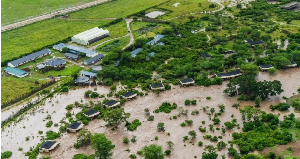- Home - News
- TWI News | TV
- Polls
- Year In Review
- News Archive
- Crime & Punishment
- Politics
- Regional
- Editorial
- Health
- Ghanaians Abroad
- Tabloid
- Africa
- Religion
- Election 2020
- Coronavirus
- News Videos | TV
- Photo Archives
- News Headlines
- Press Release
General News of Thursday, 28 September 2006
Source: GNA
Government establishes Land Bank Desk
Accra, Sept. 28, GNA - Government has established a Land Bank Desk at the Ministry of Lands, Forestry and Mines to readily assist prospective investors, both local and international, to access investment lands of all types for use.
Prof Dominic Fobih Minister of Lands, Forestry and Mines, who announced the package on Thursday, urged professional surveyors to contribute to the investment package to ease the problems of would-be investors in accessing land for the nation's development agenda. Addressing the opening of a three-day annual seminar of 2006 of the Ghana Institution of Surveyors (GIS), and the 10th anniversary celebration of the Office of the Administrator of Stool Lands, Prof Fobih called for a prompt disbursement of revenue to customary authorities, which had been accrued to them and could not yet be assessed.
The seminar, which is underway in Accra, is on the theme: =93Customary Land Administration in Ghana, the Past, Present and the Future.=94
Prof Fobih acknowledged the role of customary authorities in land management and stated that 10 Customary Land Secretariats had either been strengthened or established nationwide, to seek to equip customary authorities and train personnel in the basic rudiments of land administration.
He said there was need for Members of the Ghana Institution of Surveyors to actively seek to impact on traditional authorities' way of improving land administration to ensure equitable use of land resources. Dr Wordworth Odame Larbi, Project Manager, Government of Ghana's Land Administration Project (LAP), said about 80 per cent of land ownership was vested in the customary authorities and how land was managed within that category had major consequences in economic development.
He noted that the customary land market would continue to evolve as the economy of the country continued to grow.
Dr Larbi stated that the ultimate responsibility lay with the State in ensuring that the infrastructure need to support the operations of the land market are developed and maintained.
Mr Emmanuel Victor Asihene, District Chief Executive for East Akim, decried the spate of unauthorized structures in the cities; degradation of the natural environment and the springing up of building in waterways.
He said these showed the weakness of the Metropolitan, Municipal and District Assemblies, to exercise their powers as Planning Authorities.
Mr Asihene called for systematic public education of the citizenry on the evils of improper land use.










